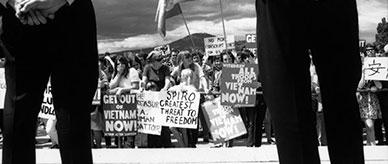
Transcript
Announcer: Conscientious objector Brian James Ross is out of jail, the governor-general having decided that the case was a proper one for exercising the prerogative of mercy. After he left Sale prison yesterday, Ross was asked by Stephen Taylor what effect the past ten months had had.
Brian Ross: Oh, I don’t think anything much. It’s pretty hard to tell though at the moment.
Stephen Taylor: How were you treated inside?
Ross: Well, Sale is pretty easy. It’s pretty free and easy, you know. They don’t hound you very much but it’s a strict business of maintaining a physical existence really. It’s a matter of feeding you and providing a place to sleep and that’s about all really at Sale.
Taylor: How were the companions that you were inside with? How did they treat you?
Ross: Oh, pretty well. Yes.
Taylor: They didn’t take it out of you at all because of why you were in?
Ross: Not at all. I got along very well with them all.
Taylor: Has ten months inside affected your beliefs at all?
Ross: Not really, no. I’d still go to jail for two years if it was necessary.
Taylor: It’s been said that you have hampered your release by your refusal to acknowledge the very existence of the National Service Act.
Ross: Well … I objected to the National Service Act because I think that people ought to be respected enough to be able to determine whether or not a certain course of action is proper or not. I think any particular situation … we ought to be respected as to knowing what we should do, you know? And I think that we should stand up against, or stand out against, any law or a government which tries to treat us in this manner.
Taylor: If you take that stand you must also believe that it is possible for you to be wrong as well as to be right.
Ross: Well you can be wrong but the government is deciding that we aren’t able to decide; that we can’t as twenty-year-olds, look at the situation, the world situation, the Vietnam situation, the general situation of this society or whatever it might be and they’re saying that we’re not good enough or we don’t know enough. It’s a matter of personal responsibility really.
Taylor: Did you discuss this sort of thing much in jail?
Ross: In jail no I didn’t, no.
Taylor: Were you forbidden to?
Ross: No I wasn’t forbidden to, I just – you know – this is my point of view or my stance or my attitude was to make it as easy as possible for myself and that was just get along with everyone as easy – easily – as I could.
Taylor: What will you do now?
Ross: Oh, ah, I’ll go home and milk my cows, I suppose. But I … apparently This Day Tonight is going to grab me around the neck and take me to Melbourne tomorrow [LAUGHS].
Taylor: Do you feel any sense of grievance against society as a result of your sentence?
Ross: No not at all. I don’t have any grudge against anyone, not against the government, not against Mr Sneddon, not against anyone. No, I saw this as more or less inevitable that I was to go to jail and that was it. I accepted it.
Taylor: You’ve become a bit of a symbol to those opposed to the National Service Act. How do you feel about this?
Ross: In a way I must admit I felt that I had to set an example, in a way. I was in the position of being in the jail, I was the first one to be moved to here. I had to keep it up and staying in jail, well, I was willing to do that, too.
Taylor: Well now that you’ve become this symbol, will you play along with the idea, or will you retire out of the picture?
Ross: Oh …
Taylor: You feel that you’ve done your bit?
Ross: Oh I feel, I feel to a fair degree that I’ve done my bit, yeah. But I think we … we don’t sort of drop right out but I think I should be left to myself a little bit.
Taylor: Would you do it again?
Ross: Oh yes, I think so, yes. Definitely I would, yes.
Announcer: Brian James Ross – out of jail and back to the farm.
[END]
About this record
This is a sound recording of an interview with Brian James Ross, the first noncomplier to be jailed for refusing to abide by the National Service Act 1964, on his release from Sale prison on 21 September 1970. The interview was made during the Vietnam War (1962–75) and broadcast by the Australian Broadcasting Commission (ABC). Interviewer Stephen Taylor questions Ross about his time in prison and objections to the Act. He asks if Ross sticks by his beliefs; if he feels any grievance against the government; what he will do in the future and if he sees himself as an example to others.
Educational value
- The case of Brian Ross is an example of the direct nonviolent action taken by many young men who refused to comply with their call-up notices under the National Service Act 1964 during the Vietnam War. Ross's stance was representative of a growing dissatisfaction amongst the population with Australia’s role in Vietnam. There were strong civic efforts to either repeal the National Service Act or to avoid obeying it.
- The National Service Act, in force from 1965 to 1972, required 20-year-old men – men too young to vote – to serve two years continuous full-time service in the Australian Regular Army, followed by three years part-time service in the army reserve. The government then amended the legislation in 1965 so that conscripts were also obliged to serve overseas if required. This requirement became a contentious public issue.
- Ross was one of hundreds of men who objected to military service in certain circumstances, or in conflicts that they did not feel were morally defensible (such as Vietnam), but who were not legally exempt from service under the National Service Act as ‘conscientious objectors’. Under the Act, the lack of provision for noncompliers on the grounds of objection to conscription or ‘selective’ conscientious beliefs proved an administrative challenge for the government.
- Ross’s grounds for noncompliance, as described in the interview, were his strong opposition to conscription and a belief in the rights of individuals to exercise choice. At his court hearing, Ross also voiced a moral objection to killing and to Australia’s involvement in Vietnam, which he believed was an unjust war. The Vietnam War was the first conflict to be extensively reported live on television and the impact of its coverage contributed to the strong civic action against the war.
- Ross was sentenced to two years jail under the Commonwealth Crimes Act, but released after mounting public pressure and press coverage prompted an ACT Supreme Court enquiry into his case. Justice Smithers found Ross to be exempt from military service under section 29A (1) of the National Service Act and he was released after the Governor-General granted him mercy, possibly alleviating some of the political pressure on the Government to soften its stance.
- Under section 29A (1) of the National Service Act, a ‘conscientious objector’ is a person who sincerely believes that it is wrong to engage in any form of military service. Between 1965 and 1971, just over 1000 men applied for this status. Of the 1052 applicants, 733 were granted total exemption from any military service, 142 were exempted from combat duties and 137 had their applications rejected.
Acknowledgments
Reproduced with the permission of the Australian Broadcasting Corporation – Library Sales.
Learning resource text © Education Services Australia Limited and the National Archives of Australia 2010.
Related themes
Need help with your research?
Learn how to interpret primary sources, use our collection and more.


